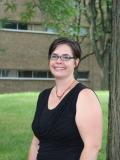2024 Recipients
Dr. Zeynep Saygin & Dr. Rachael Frush Holt
Prenatal neural architecture of the linguistic mind
Project Description
How does the capacity for uniquely human cognition like language arise in the brain? Our recent work suggests that language cortex is specialized even in infancy and the connectivity of this cortex may predict later-developing cognitive outcomes. We will leverage advances in fetal neuroimaging to investigate what aspects of the neural architecture for language are determined prenatally, and how this architecture changes postnatally with language experience, and other environmental factors. Healthy pregnant persons and fetuses have been scanned with fMRI for decades, showing that characteristic networks are detected starting at 20 weeks gestation. However, the development of fetal functional brain organization (e.g., for language), and how it predicts later cognitive outcome remains largely unknown.
Research Team

P.I. Zeynep Saygin, Ph.D., Associate Professor in Psychology, OSU
Dr. Saygin explores the origins of the human mind and she investigates how neuroanatomy determines the functional organization of the human brain, and how the existing architecture changes with typical or adverse experience. She uses longitudinal neuroimaging to measure brain activity and connectivity pre and postnatally, and computational modeling to predict brain and behavioral outcomes, with specific interests in reading, language, and executive function. She is also a core affiliate of the Chronic Brain Injury institute at OSU, using early brain data to predict susceptibility to brain injury and recovery outcomes, and is an active member of the Center for Cognitive and Brain Sciences. Her expertise in longitudinal neuroimaging and computational modeling of individual variation in early development, and dedication to health equity are vital for the success of this project. Learn More >

P.I. Rachael Frush Holt, Ph.D., Professor in Speech and Hearing Science, OSU
Dr. Holt’s research/teaching interests include speech perception, language, neurocognitive, and psychosocial development in children with typical hearing and those who are deaf or hard-of hearing (DHH) and use cochlear implants or hearing aids, family environment effects on developmental outcomes in children who are DHH, and accent perception across the lifespan. She is also the department’s DEI Chair and a member and past Associate Director of the Center for Cognitive and Brain Sciences. Her expertise in longitudinal behavioral assessment, environmental moderators/mediators of neurocognitive outcomes, and dedication to health equity are important for this project. Learn More >
Co-P.I. Kelly Hiersche, B.S., Graduate Student in Psychology, OSU Learn More >
Co-P.I. Anna Quatrale, B.S., Research Assistant in Psychology, OSU Learn More >
Co-P.I. Journie Dickerson, B.S., Graduate Student in Speech and Hearing Science, OSU Learn More >
